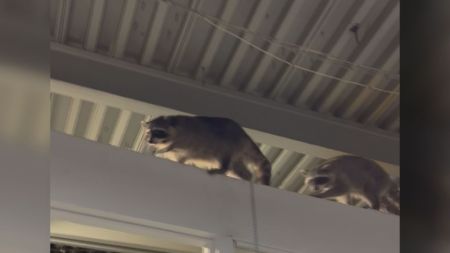Blood
‘Blood everywhere’: Man and dog injured by trio of raccoons in Vancouver
A Vancouver man and his dog are both recovering from injuries after they were attacked by a trio of raccoons in Kitsilano last week.
Jake Moss and Pingu were walking down West 1st Avenue around 1:30 a.m. on Aug. 3 when Pingu stopped to sniff the bushes and encountered two large raccoons.
“All of a sudden, the two of them just pounced on him and it just started a fight that lasted — I mean, it felt like an hour, but it may have been two minutes,” Moss recalled.
“Every time one would grab (Pingu), I would pick him up and throw him. I would kick them and it was just a tag team. Then a third racoon joined in.”
0:25
Raccoons surprise SeaBus passengers
Moss said the raccoons bit and scratched his legs and “got the fangs right in” his hand while trying to reach his face. Every time he ripped one off his dog and threw it away, another one took hold, he added.
“I fought them for a couple of minutes. There was blood everywhere. I didn’t even know where it was coming from, and eventually they just they just left.”
While he and Pingu fought valiantly, Pingu lost an eye in the attack. Moss said a neighbours at the nearest apartment building rushed out to help, driving them both to their respective hospitals.
Moss was treated at the Vancouver General Hospital, where fragments of raccoon tooth were removed from his puncture wounds, while Pingu went to the Burrard Animal Hospital for surgery.
Apparently, it wasn’t the first raccoon attack in the neighbourhood.

Emma Yendoll, her friend and their dogs were also attacked in the same area on Aug. 3. She said they were walking around 8:30 p.m. when she saw the raccoon and the dogs began barking.
“We started moving, before I knew it, I had a raccoon attached to my leg. It had just come straight at me for some reason. I was in between my dog and the raccoon,” she told Global News.
The group was helped by the same neighbour who helped Moss, she added — Mark Harrison, who reportedly ran out of his building to yell at the raccoon. It fled into the bushes, but “kept trying to come back at us,” Yendoll said.
“I walked down the street and realized I had blood pouring out of my leg. Me and my friend went straight to the emergency room and she took her dog to the vet.”
Yendoll’s dog was uninjured, but she said she got a tetanus shot, stitches for bite marks, and was left with other scratches and bruises. Her friend’s dog had bites on his legs and stomach.

Harrison said he couldn’t believe it happened twice in one day and has since made signs warning of the neighbourhood menace.
“Enough is enough,” he said in an interview. “Something definitely needs to be done.
“The city needs to step up or these animal companies need to come in and do something about these raccoons — relocate them to the wild so they can’t attack people and dogs.”
Harrison said a similar raccoon attack happened in 2017 on the other side of the same street.
Both Moss and Yendoll said they’d like to see some intervention on the raccoon threat as well. Moss said someone in the neighbourhood has been feeding the animals and it’s a “known issue” in the community.
He contacted the City of Vancouver, Environment Canada and the B.C. Conservation Officer Service over the weekend, he added, but the only solution offered to date is a suggestion he contact a private animal control or pest company.

In an emailed statement, the City of Vancouver’s manager of animal services confirmed an investigation is underway into reports of people feeding wildlife at 2090 West 1st Avenue — where last Thursday’s attacks took place.
“Raccoons fall outside of the City’s regulations as they are protected under the Provincial Wildlife Act,” wrote John Gray.
“While we do not have a raccoon policy, we do have new a Wildlife Feeding Bylaw, which prohibits the feeding of wildlife anywhere in Vancouver.”

Randy Celinski, president of B.C.’s AAA Wildlife Control, said raccoon attacks happen pretty much annually at this time of year, which he described as “baby season.”
The gravity of Thursday’s events, however, is rare.
“It’s just typically raccoons that are more on the defensive then anything else,” he explained. “Conditions are ideal for raccoons in cities. No predators — no natural predators, anyway, lots of housing and free food.”
Celinski said it’s possible the attacks may not be related to feeding, but to the protection of babies in the bushes where the raccoons were hiding. It’s difficult to remove raccoons, he added, because once you take one, “there’s five others that will replace it.”
“Just be mindful, especially this time of year,” Celinski advised. “We’re right in the prime of the time of year when all the babies are maturing into teenagers and they’re out and about with the mothers.”
More on Science and Tech
© 2023 Global News, a division of Corus Entertainment Inc.




